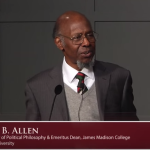College Accreditation: Employment Not Even Afterthought
Apparently the only jobs college accreditation reviewers are interested in are their own, not those of recent college graduates.
“Accreditation has become a roadblock to reform,” Hank Brown, the former president of the University of Colorado, said at the Heritage Foundation yesterday, “a system that leads to majors that go nowhere.”
I asked him whether college accreditation boards even considered the post-graduation employment of graduates as an afterthought in their reviews. “I’ve seen very few accreditation ratings that focus on that,” he said. “I think that would be of great value.”
Brown is also the former president of the University of North Colorado. “When it comes to federal funding of higher education, the government’s approach to quality assurance and consumer protection is a public policy and regulatory failure by almost any measure,” Brown wrote in a paper which the American Enterprise Institute (AEI) published a year ago. “For nearly half a century, the federal government has largely outsourced the determination of which colleges and universities are eligible to receive federal taxpayer money—in the form of student grants and loans—to member-based, geographically oriented accrediting agencies.”
“The rationale was to ensure that students attended quality institutions from which they were likely to graduate and be employable, thereby safeguarding students and ensuring taxpayer dollars were well spent.” Brown has also served with distinction in the United States House of Representatives and the U.S. Senate.
Currently, in addition to his law practice, Brown heads the Accreditation Reform Initiative of the American Council of Trustees and Alumni (ACTA). Anne Neal, the founder of ACTA, was on the panel with Brown at Heritage.
“Today, nearly 7,000 colleges, universities, and professional schools in the United States are accredited (sometimes by more than one accrediting body),” Neal noted in testimony before Congress last year. “And institutions rarely lose accreditation.”
“Parents and the public mistakenly believe accreditation is a good housekeeping seal of approval, proof that an institution has passed rigorous tests and is capable of ensuring students will graduate with a quality education.” Neal testified before the U. S. House Education and Workforce Committee’s Subcommittee on Higher Education and Workforce Training.
Interestingly, in her testimony last year, Neal observed that “Nearly 15% of U.S. college students study without ever setting foot on campus. The lecture as the primary means of delivering learning is rapidly being replaced by new teaching methods that blend technology and classroom experiences in ways that boost student outcomes. America’s leading universities and faculty are creating Massive Open Online Courses (MOOCs) in which hundreds and thousands of students from all parts of the world enroll in a single course.”




